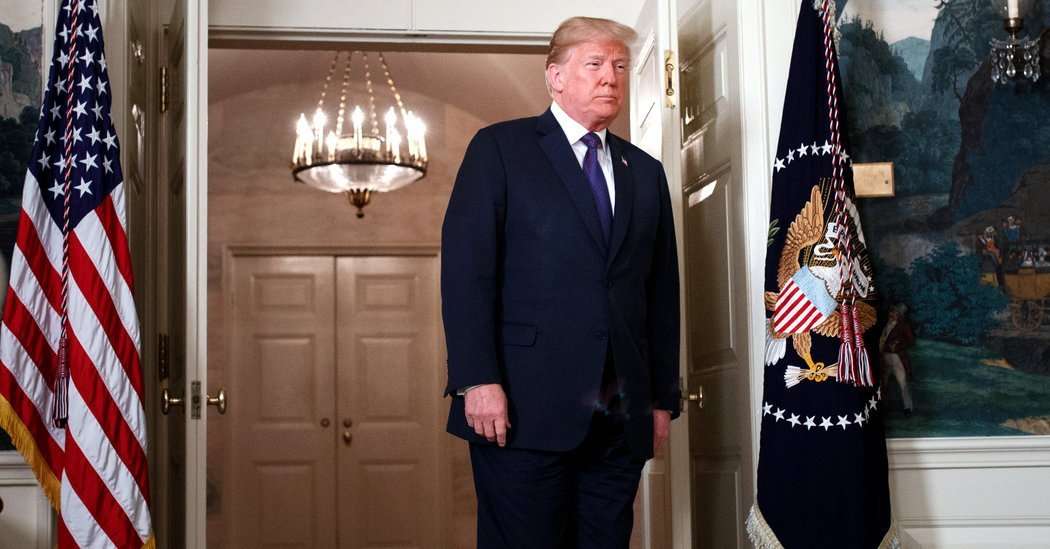The response from Iran itself, however, was muted. President Hassan Rouhani declared that the Iranians intended to abide by the terms of the deal, and he criticized Mr. Trump for his history of not honoring international treaties. Mr. Trump won strong backing from Saudi Arabia and Israel, whose leader, Prime Minister Benjamin Netanyahu, hailed him for a “historic move” and “courageous leadership.”
Three times previously, the president’s aides had persuaded him not to dismantle the Iran deal. But Mr. Trump made clear that his patience had worn thin, and with a new, more hawkish cohort of advisers — led by Secretary of State Mike Pompeo and the national security adviser, John R. Bolton — the president faced less internal resistance than earlier in his administration.
While Mr. Trump had long scorned the Iran deal, threatening repeatedly to rip it up during the 2016 presidential race, his impulse to act now was reinforced by what he views as the success of his policy toward North Korea. He has told aides and foreign leaders that his policy of maximum pressure had forced Mr. Kim to the bargaining table, and that a similar policy of overwhelming pressure would enable the United States to extract a better deal from Iran.
As Mr. Trump abandoned one diplomatic project, he accelerated another — announcing that Mr. Pompeo was flying to Pyongyang, the capital of North Korea, to continue discussions with Mr. Kim about the upcoming summit meeting. He expressed hope that three Americans who are detained in the North would be released soon.
“The message to North Korea,” Mr. Bolton told reporters, “is the president wants a real deal.”
He rejected the suggestion that the United States could not be trusted to keep its agreements when political winds change. “Any nation reserves the right to correct a past mistake,” Mr. Bolton said, citing President George W. Bush’s decision to withdraw from the Antiballistic Missile Treaty in 2001.
The Trump administration, he said, would continue to work with Europeans to pressure the Iranians. He dismissed those who said the United States was on a path to war with Iran, though he did not present any new diplomatic initiatives. Another senior administration official acknowledged that there was no Plan B.

firemage22 on May 8th, 2018 at 18:40 UTC »
Anyone who didn't see this coming when John Bolton chickenhawked his way back into the WH, is blind.
BeamishLiteralism on May 8th, 2018 at 17:58 UTC »
I wonder if there is anything left to dismantle from Obama. Can he bring Bin Laden back to life?
WhiteTrashInTrouble on May 8th, 2018 at 16:27 UTC »
Some basics of the deal itself, if anyone is curious.
Enrichment
Iran's enrichment capacity, enrichment level and stockpile will be limited for specified durations. There will be no enrichment facilities other than Natanz. Iran is allowed to conduct research and development on centrifuges with an agreed scope and schedule. Fordow, the underground enrichment center,[9] will be converted to a "nuclear, physics and technology centre".
Reprocessing
The Heavy Water facility in Arak with help of international venture will be redesigned and modernized to "Heavy Water Research Reactor" with no weapon grade plutonium byproducts. The spent fuel will be exported, there will be no reprocessing.
Monitoring
Implementation of the modified Code 3.1 and provisional application of the Additional Protocol. Iran agreed IAEA procedure which enhanced access by modern technologies to clarify past and present issues.
Sanctions
When the IAEA verifies Iran's implementation of its key nuclear commitments:
The EU will terminate all nuclear-related economic sanctions. The United States will cease the application of all nuclear-related secondary economic and financial sanctions. The UN Security Council will endorse this agreement with a resolution which terminates all previous nuclear-related resolutions and incorporate certain restrictive measures for a mutually agreed period of time.